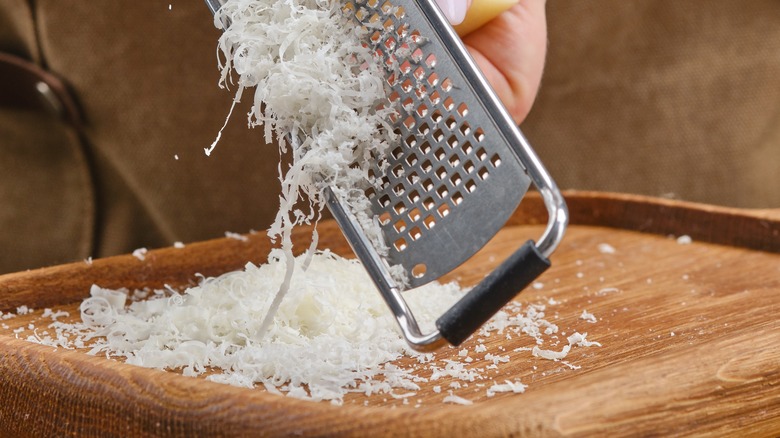Martha Stewart's Trick For Bringing Parmesan Cheese Back To Life
What would we do without domestic diva Martha Stewart bringing us solutions to problems we never knew we had? One such tip is how to soften up parmesan cheese once it gets hard. Yes, parmesan is a hard, dry cheese to begin with, which means it lasts for a good few months in the fridge. True, the longer it's in there, the harder and dryer it can get, but the great — or rather, grate — thing about it is, you can still use a microplane or the small side of a box grater to render it usable. Even if the cheese develops a few blue spots, it's safe to just cut off the moldy bits.
Still, if you're the type of person to always ask yourself WWMSD, we'll tell you: Martha Stewart, who is particularly picky about her parmesan, will spring into action when confronted with a block of dried-out cheese. What she'll do is wrap it in a wet piece of cheesecloth (at last, this fabric gets a chance to live up to his name!) and then cover the whole thing in plastic wrap. After the wrapped cheese spends a few hours in her refrigerator, it should be somewhat moister than before. If you choose to follow suit, you may not find this tip to be a money-saver because, as previously pointed out, there's no need to toss dry parmesan, but it might save you a few knuckle scrapes since softer cheese is admittedly easier to grate.
There are other ways to soften your parmesan
Even if you'd rather not grate rock-hard cheese, there are ways to repurpose your parmesan that don't involve the compost bin. If you're okay with using parmesan rinds, which are the hard outer parts of the cheese, to flavor pizza sauces, pasta dishes, and soups, why hesitate to use a chunk of cheese in the same way? If you still want to soften it, though, there are other methods besides Martha's. One basic method of adding moisture is very similar to hers, except a Ziploc bag or sheet of foil is employed in place of plastic wrap. You still do the damp cheesecloth wrap, however, followed by refrigerating the cheese. There are those who also wrap the cheesecloth in wax paper before encasing it in plastic or foil.
A few other parmesan-softening tricks replace the water with other liquids. One way to do this involves vinegar, which is either used to moisten the cheesecloth in place of water or to enclose a vinegar-soaked sponge in a resealable plastic bag along with the dried-out cheese. Another tip involves brushing the cheese with milk and microwaving it for a minute, which might be good to try if you need that softer cheese ASAP. Why vinegar or milk might work differently than water, we really can't say as we're not kitchen chemists, but as with many household hints, these suggestions are all based on what has worked for somebody at sometime in the past.

